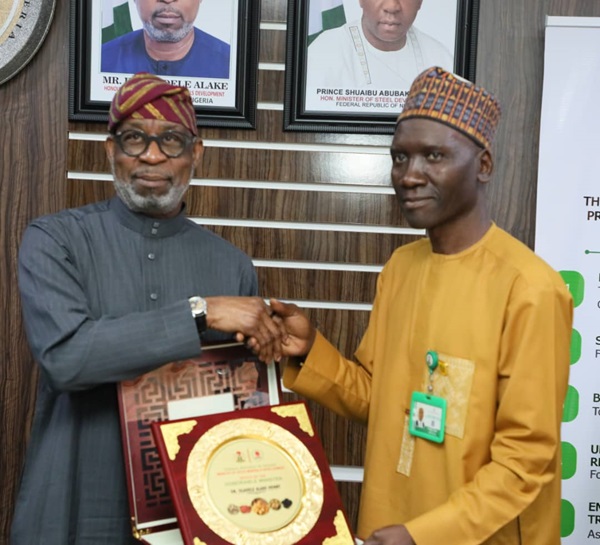
The Minister of Solid Minerals Development, Dr. Dele Alake has challenged the National Institute for Policy and Strategic Studies (NIPSS) to go beyond its traditional advisory role and become a catalyst for societal mindset transformation – an essential component he described as critical to Nigeria’s long-term sustainable development.
Alake made the call on April 30, 2025, in Abuja while addressing participants of Course 47 from NIPSS during a courtesy visit to the Ministry of Solid Minerals Development. In his remarks, he emphasised that national development is not achieved solely through policies, infrastructure, or economic models, but rather by a shared and renewed national consciousness among citizens.
He argued that Nigeria’s developmental challenges are deeply rooted in the attitudes and mental orientation of its people. “Unless the mental orientation of Nigerians aligns with national development goals, progress will remain sporadic and unsustainable,” he said. “Your mandate goes beyond writing reports. You must engineer the transformation of our people’s attitudes to drive a national renaissance. If the mindset remains flawed, even the best policies will flounder.”
Alake acknowledged the existence of numerous well-crafted policy documents and blueprints over the years but noted that implementation had often fallen short due to a disconnect between vision and grassroots action. He urged NIPSS to help translate high-level policies into practical, digestible actions that communities, local governments, and grassroots leaders can understand and execute.
Turning attention to the solid minerals sector, the minister highlighted years of neglect that allowed illegal miners and syndicates to operate with impunity. However, under the Tinubu administration, he said the ministry had made significant strides in reversing this trend through enforcement, reform, and formalisation.
In the past year alone, over 300 illegal miners had been arrested, including foreign nationals. About 150 individuals were undergoing prosecution, while 98 illegal mining sites had been shut down. The establishment of the Mining Marshals, a specialised enforcement unit, had already led to nine convictions in court. In addition, more than 250 mining cooperatives had been formed to help artisanal and small-scale miners transition into the formal economy.
This formalisation, the minister explained, was not just a matter of compliance but also a way to enhance transparency and increase government revenue through better monitoring and royalty collection. “These accomplishments reflect a broader commitment by the Tinubu administration to stop systemic wastage and redirect national resources toward sustainable use,” Alake stated.
He further noted that the President’s approach to governance was rooted in a philosophical shift: “President Tinubu’s reforms are not just technical – they’re philosophical. They’re designed to change how government operates and how citizens relate to the state. If we don’t correct the mindset first, every other reform will hit a wall. That’s why your role at NIPSS is so important.”
Responding on behalf of the NIPSS delegation, Dr. Musa Emmanuel thanked the minister for his candid insights and praised the ministry’s reforms. He described the engagement as enlightening and expressed optimism that the lessons learned would enrich the course participants’ understanding of governance and policy.
Emmanuel also lauded the transparency and direction the Ministry of Solid Minerals Development had adopted, particularly its alignment with Nigeria’s goals of economic diversification and a greener economy. He underscored the importance of agencies such as the Nigeria Geological Survey Agency (NGSA) and the Mining Cadastre Office (MCO), whose contributions are central to responsible mineral development and environmental sustainability.
Echoing the minister’s sentiments, the ministry’s permanent secretary, Dr. Mary Ogbe called on NIPSS to spearhead a nationwide mindset reset that would reposition Nigeria’s solid mineral sector as a central pillar of national development. She stressed that while Nigeria is blessed with over 44 commercially viable mineral types, the sector remains underexploited due to regulatory inefficiencies, lack of investment and – most crucially – national apathy.
“We need institutions like NIPSS to foster a new national consciousness that prioritises responsible and strategic exploitation of our natural resources,” Ogbe said. “We need a shift in perception – one that views solid minerals not as mere commodities, but as levers for industrialisation, job creation and national prosperity.”
She pointed out that NIPSS has the intellectual capacity and strategic influence to redirect national attention from oil dependency to the immense opportunities in the mineral sector. “We are counting on you to help reset the national dialogue around minerals from neglect to necessity.”
A statement by deputy director of press and public relations at the ministry, Kania Andeyaba confirmed that the visit marked a new chapter of collaboration between NIPSS and the Ministry of Solid Minerals Development. The meeting ended with a shared understanding of the need for continued engagement, institutional collaboration, and national reorientation to unlock the transformative power of Nigeria’s natural resources.
Alake reaffirmed that Nigeria’s future depends not only on policy and investment but on its people’s ability to embrace change. “The success of any national agenda depends on the willingness of citizens to be part of the process. NIPSS must drive that message home.”
As Nigeria pushes forward with its ‘Renewed Hope’ agenda, this meeting stands as a rallying call for institutions, policymakers, and citizens to align their values, vision, and actions towards a prosperous and sustainable future.


